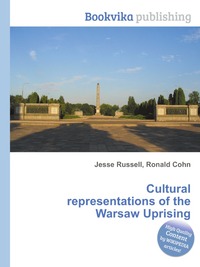High Quality Content by WIKIPEDIA articles! The representation of the Warsaw Uprising in the media had already become controversial even before it began. By the time it ended in capitulation in October 1944, the questions about why no effective support had been available were in the public mind, but debate about them remained unclear in the wartime situation. After the war, information about the uprising was suppressed under communism, gradually resurfacing from the 1960s until finally in the 1990s more or less the full story could be told. The 60th anniversary in 2004 was marked by widespread discussion in the media both in Poland and through the rest of the world; this coincided with the opening of a museum of the uprising in Warsaw and many public ceremonies involving those who had fought in the uprising. Данное издание представляет собой компиляцию сведений, находящихся в свободном доступе в среде Интернет в целом, и в информационном сетевом ресурсе "Википедия" в частности. Собранная по частотным запросам указанной тематики, данная компиляция построена по принципу подбора близких информационных ссылок, не имеет самостоятельного сюжета, не содержит никаких аналитических материалов, выводов, оценок морального, этического, политического, религиозного и мировоззренческого характера в отношении главной тематики, представляя собой исключительно фактологический материал. Это и многое другое вы найдете в книге Cultural representations of the Warsaw Uprising (Jesse Russel)
Cultural representations of the Warsaw Uprising Jesse Russel
Подробная информация о книге «Cultural representations of the Warsaw Uprising Jesse Russel». Сайт не предоставляет возможности читать онлайн или скачать бесплатно книгу «Cultural representations of the Warsaw Uprising Jesse Russel»
